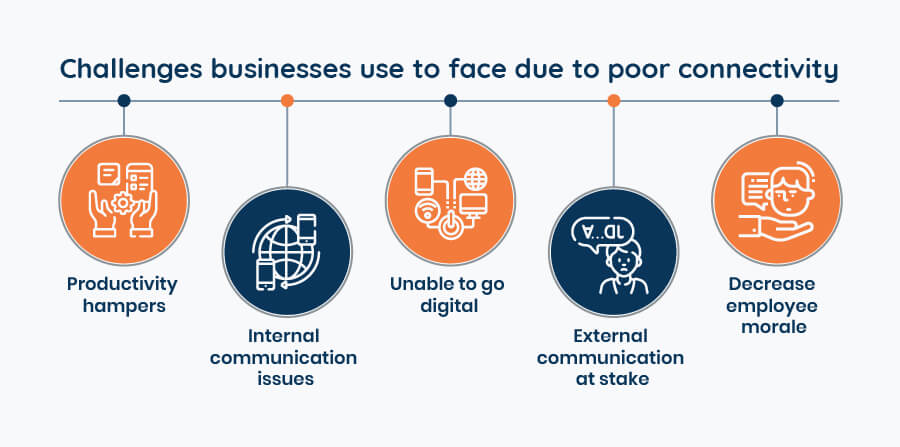The 5G Revolution: What it means & the impact on business
The arrival of 5G and what it means
The arrival of 5G technology will not only transform our devices but will also have a significant impact on the way businesses operate and communicate. The introduction of 5G wireless technology is expected to reduce maintenance costs and energy consumption in the telecom industry, ultimately leading to faster and more reliable connections for businesses. As 5G technologies continue to evolve, it will change the way we spend our lives and access technology. The role of 5G in business and communication is crucial, especially in the face of crises such as pandemics or black swan events.
By 2024, forecasts predict that there will be around 1.9 billion 5G subscriptions worldwide. Developed countries such as Asia and North America are expected to embrace the 5G technology faster than the other regions. By 2025, around half of the overall telecom industry is projected to be 5G-enabled in these two regions. (Source)
Technological advancements, including 5G, are essential for businesses to not only survive but also to sustain themselves in the post-crisis period. With its promise of high-rate connectivity, reliable communication, and vast network capabilities, 5G will revolutionize the way businesses operate, offering a leap to universal connectivity and a seamless customer experience. Designed to connect everyone and everything together, including gadgets, objects, and devices, 5G will create a more uniform user experience and have a significant impact on the 5G revolution in the world of business.
A Telco’s guide to 5G: How Telecom players can help their customers adapt
Challenges businesses use to face due to poor connectivity
Low network coverage is affecting businesses all over the world.
Here is some of the common challenges businesses face due to poor connectivity.

Productivity hampers
With slow network connectivity, inevitably, the business operations get delayed. A huge amount of time will be lost due to a poor internet connection. This certainly will impact business growth.
Internal communication issues
Seamless internal communication with employees and keeping them updated is key to a successful business. Now poor connectivity, it definitely creates miscommunication, and hence, makes you not adhere to deadlines.
Unable to go digital
Today, businesses are moving to cloud infrastructure. Due to slow internet, they are unable to take full advantage of it. The online business tools are producing only satisfactory performances and upload are suffering massively.
External communication at stake
In this digital age, customers expect a prompt response through various digital customer engagement platforms. Due to internet issues, businesses are struggling to meet the standards and unfortunately, missing out on a huge market.
Decrease employee morale
A long time in downloads or uploads truly impacts employee morale. Having to wait for buffering causes stress, makes them less interested, and lags in their work. These affect businesses as a whole to a higher level.
The 5G impact on the Telecom industry
Modern communication systems have evolved significantly since the days of switchboards and long-distance calls but perhaps, that is, not enough: regular, one-size-fits-all network designs have fallen significantly behind in the past decade. The Telecom industry needs scalable networks that can smoothly adapt to meet shifting demands and must prepare for expanding use cases featuring connected devices in nearly every industry. While traditional structures have fallen short of meeting these demands, many of these requirements are addressed through 5G systems. According to a study, 5G is expected to deliver speeds up to 100 times faster than typical 4G technology. (Source)
But 5G is much more than an enhanced replacement for 4G LTE. It’s a new approach to infrastructure that introduces modularity and flexibility to an industry that’s previously has been dominated by dogmatic, purpose-built hardware. 5G advances communication technology to meet changing demands in many important ways such as:
- Higher data-throughput rates
- Reduced latency
- Energy savings
- Cost reduction
- Increased system capacity
- Massive simultaneous device connectivity
- Economies of scale
4 Major strategies to improve telecom customer service
To realize these gains, these systems must support a much wider range of devices regardless of their latency support, coverage area, etc. Let’s explore how 5G will change business, especially benefit the telecom industry.
5G will bring better coverage everywhere
With 5G, the lightning-fast speeds will be delivered over a wireless instead of cable. Therefore, rural and suburban areas will have access to high-speed internet that they could not access through a wired connection. High-speed internet access is significant in pushing rural industries like farming and agriculture to evolve. Telecommunication providers will make small cell deployments more effective through high-speed internet, allowing lightweight, easy-to-mount network base stations to increase capacity and coverage in densely populated areas.
Networking-as-a-service
Network slicing supports various virtual networks to be constructed on top of an accorded physical infrastructure. So, several types of applications and services will be able to run on permitted infrastructure. This allows the telcos to provide networking on-demand, creating a customer experience that is identical to a physically distributed network. Capacity and coverage can be allocated in logical parts to meet the particular demands of each user, effectively reducing the need for telecoms to create custom networks for specific tasks or projects, and providing connectivity in the most efficient way possible.
How will 5G impacts your business in general?
5G is the fifth-generation technology of public wireless networks. It is less of evolution from 4G than a giant leap forward. 4G networks are built with large radio towers that transmit signals over long distances using lower frequency radio waves. 5G networks will add many more small-cell antennas connected to buildings, streetlights, and other objects. These small cells will transmit massive amounts of data over short distances using an ultra-high-frequency spectrum. This combination of different network access points, frequencies, and cloud-based network technologies will create the 5G networks of the near future. There are three key characteristics of 5G network business opportunities:
- More capacity
- Faster response times
- Lightning-fast speed
Lower latency means a greater possibility
Latency refers to response time; the length of time it takes between something is sent and received. The current 4G latency is about 50 milliseconds. 5G latency will decrease that to about one millisecond, faster than the blink of an eye. Low latency is important for anything that requires a true real-time reaction, such as self-driving vehicles and remotely controlled robotics. It also means more opportunities to use augmented reality (AR) and virtual reality (VR).
Lower latency means businesses will stream high-resolution video, audio, and images promptly, without any lag or glitches. This means richer communication experiences with both customers and remote workers. Innovative businesses looking to use cutting-edge applications like AR, VR, or 3D will do so in a more meaningful way with 5G. Contractors and interior designers will walk clients through virtual rooms before building the real thing, enabling easier decision-making and more accurate outcomes.
The 5G connectivity advantage
Adding more capacity to the network will raise the number of devices that can communicate with each other. Although the IoT is becoming more widely adopted, most of the communication today happens between people using smartphones. With 5G, we’ll see a dramatic increase in devices and machines talking (read: communicating) to each other.
Smart cities of the near future are forecasted to have millions of sensors per square kilometer; all connected to the 5G network and enabling IoT devices. This connectivity will help emergency responders arrive faster by rerouting traffic, and aid governments in managing natural disasters to help save lives and infrastructure.
Companies with machinery will be able to use IoT with 5G to maximize the efficiency and usage of equipment. For instance, a delivery company can use IoT with 5G to pinpoint a truck’s exact location in real-time to alert the recipient and ensure that the most efficient and effective routes are in use at all times. While some organizations currently use IoT for asset management, 5G will speed up the process, and provide even more precise data. From a warehousing perspective, 5G will allow companies to use smart shelves that can track when a product is running low and trigger an action that will keep the supply chain running smoothly and efficiently.
A big increase in bandwidth
Increased bandwidth in 5G will allow for very high download speeds which will improve applications and reduce bottlenecks. The change from 4G to 5G will be dramatic. Suppose, if every fan at a Football game tried to leave the stadium from the same door that can be the experience on an overburdened 4G network. The increased bandwidth of 5G will be like opening every door in the stadium.
Boost to bandwidth means that massive video files or presentations can be shared in seconds, providing agility for remote workers who may need to download files on the go. Likewise, remote workers can seamlessly involve in HD video communications no matter where they are located.
The promises of 5G are numerous and are more than just hype, they’re on their way. 5G will change the way that governments, enterprises, and small businesses alike will communicate, work, and engage with customers and partners. The possibilities of 5G are only treated by what businesses can imagine and create, so now is the time to consider how your business can unlock, benefit, and thrive from the potential of 5G.
Maximize customer satisfaction with telecom expertise
How you can enhance customer experience with proactive support
5G technology impacts business, immensely. Telecom services providers will be able to employ 5G in their customer service operations which will make their users happy and help convert potential clients. Here are some of the ways 5G will help improve the customer experience:
Improved Call Quality
With 5G there is a big improvement in call quality issues. 5G eliminates the latency issues of 4G that made customers experience poor call quality and call drops.
More effective communication
In order to give a better customer and user experience, telcos will be able to gather customer data, research, and analytics using 5G technology. Telecom companies can stream HD videos for customer onboarding and product training. Customers and telecom service providers can connect using video conferencing to solve queries and build stronger relationships.
Better mobility
5G allows immediate connections and real-time sharing of data to solve customers’ problems while on the move. It also connects with more devices at a time which will result in a better customer experience.
Seamless, personalized customer journey
Today’s telecom giants are already concentrated on providing customized, connected customer experiences. 5G will allow fast data. Data that is accumulated recovered and operationalized at speeds and volumes that we can’t think of. AI tools that learn from this data will get considerably more intelligent as a result. In the 5G era, we will see much better connectivity between businesses and customers. That is why it is often called the ‘5G economy’.
The result is that 5G will enable the telecom companies to achieve real-time, radically personalized, and predictive engagement with customers. For instance, it will become commonplace to barge into an online retail store and find that the upselling and cross-selling agent, armed with layers of information about your behavior and preferences can immediately create a rich, tailored shopping experience. Real-time personalization and the move from content consumption to greater engagement can transform consumers’ relationships with brands across virtually every industry.
Immersive experiences will rise to new heights
Users of VR or AR reality feel frustrated if there’s a delay of more than 20 milliseconds, far below the typical 4G latency(Source). When 5G enables latency to drop more than you can imagine, Virtual and Augmented Reality will be processing images faster than the human brain. The experience will be as close to real as possible. Top e-commences are already using AR to help customers visualize how furniture will fit into their home or will the shade fit your eye. 5G will transform the customer experience by enabling an unprecedented level of immersion, which will transform everything from shopping for clothes to buying a home. Because VR and AR capture consumers’ attention and trigger their emotions more than any other medium, this evolution has the potential to usher in a deeper level of engagement with brands.
Connected IoT devices will improve user experience
The fidelity and reduced latency of 5G will enable the number of connected devices with embedded sensors to multiply and will make it much easier to control them remotely. This will drastically improve the customer experience especially in the telecom industry and across a variety of businesses as well. For instance, in healthcare, 5G will make it easier for providers to supply remote diagnosis and treatment with the aid of sensors on wearable devices. Smart home devices will be able to predict the need for maintenance or service. This is already happening in some cases. Self-driving cars will be able to react more quickly to the surrounding environment, reducing risk, and improving the passenger experience. Cable and broadband companies will be able to surface diagnostic data about network conditions, arming customer representatives with knowledge about network issues, or conducting proactive outreach.
How 5G is set to impact video surveillance for businesses?
The possibilities are endless
The Telecom industry should be open to new opportunities for 5G. People love their smartphones and will love doing business with companies that provide a lightning-fast internet connection. With internet answering services and 5G, you can take your customer experience to the next level!










